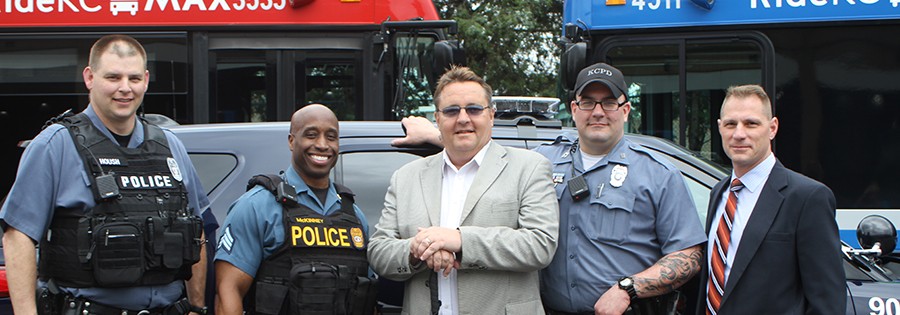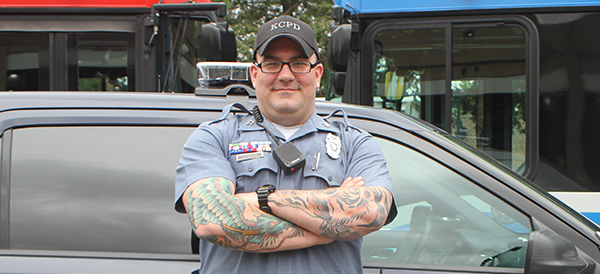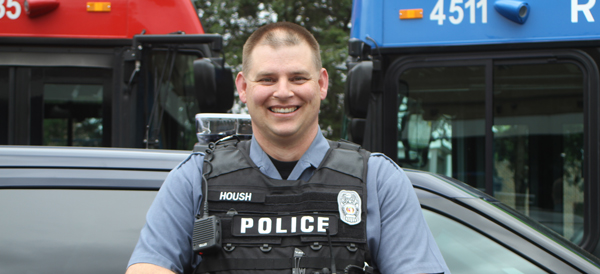Meet the Safety Officers

As we approach the middle of 2016, there is good news for bus operators and passengers. So far this year, no operator has been assaulted. With a variety of measures, including enhanced driver training, new incident response procedures and more safety staff, KCATA is working to keep everyone safe on buses.
And now, Kansas City Police Officers Chris Sticken and Matt Housh have been brought on board to protect our operators and the riding public. It was a historical hiring, of sorts. It’s the first time Kansas City has dedicated police officers to patrolling the 26,930-mile bus system.
While the officers complement the 39 off-duty cops who already patrol the bus network, dedicated full time officers give the KCATA the flexibility to immediately respond to disruptive behavior on a bus, at a transit stop or on the agency’s property.
Sticken is an 11-year veteran of the Kansas City, Mo. Police Department where he worked in the Metro, East and North patrol divisions. He also served as a corporal in the Marines from 1997 to 2001. He’s specially trained in street-level crime fighting skills that teach officers diverse skills, including how to deal with deadly force and how to foster better community relations among many other tools.
Housh comes to the KCATA from the Kansas City, Mo. Police Department where he’s worked since 2011. He also worked for the Gladstone Police Department from 1999 to 2011. He has specialized training in basic and advanced accident investigations, as well as accident reconstruction.
Recently, Housh and Sticken agreed to sit down and share a little about themselves and give the public a little better insight into who is protecting them on the bus.

Officer Sticken
Why did you become a police officer? “My whole family has basically been in policing. I got out of the Marine Corps and felt law enforcement was a natural progression for what I was supposed to do.”
What did you do in the Marines? “I spent three years in North Carolina at Camp Lejeune, a tank battalion one year and an artillery battalion one year. I spent my final year in Japan where we went to Korea and Australia. I got out there. I got to see the world. I got to meet a lot of people.”
What do you like most about being a police officer? “Mostly my interactions with people, helping out the city when I can.”
What’s the most personal satisfaction you get from being an officer? “Helping out kids who don’t get the best treatment at home.”
Why become a transit officer? “I spent 10 years in patrol as a police officer. Over the course of that 10 years, I had to deal with calls for service, self-initiated activity and the whole spectrum of law enforcement. Transit allows you to focus on a particular area of the city and concentrate your efforts. I get to stay in patrol, so to speak. But I get to concentrate my whole day on one thing.”
Family: Married for six years. Has a 5-year-old daughter and a 2-year-old daughter.
Hobbies: Video games and yard work. “I have a massive yard with nine fully grown 50-year-old trees. It’s something at home that’s mine to do. It takes away all my stress.”
Favorite place to eat in Kansas City: Gates Barbecue
If you weren’t a police officer you would be: A stay-at-home dad.

Officer Housh
Why did you become a police officer? “To help people and a sense of belonging to something greater than yourself.”
What do you enjoy most about being a police officer? “Every day is different. No two calls are exactly the same. There’s no monotony. I couldn’t see myself behind a desk day in and day out.”
Do you feel at risk being a police officer? “It’s in the back of your mind that there’s the inherent risk of being a police officer. There’s danger in every job. Our risk might be higher because of some of the situations we’re put into. You pray you go home at night. I do my best to make sure I go home at night.”
What attracted you to being a transit officer? “Patrol’s primary function is calls for service. We still have calls for service for transit, but it’s one area not multiple areas. We can spend more time on a call dealing with an issue, looking for a solution rather than just being a report-taker. I wanted a change of pace where I can specialize in this one area and try to impact it the best I know how.”
How much do transit officers deter disruptive behavior? “It shows enough is enough, that the ATA along with the city of Kansas City and the police department are not (tolerating) it any more. If you’re out here at the bus stop or riding our buses you should be following the code of conduct.”
Family: Married 15 years with a 12-year-old son and 9-year-old daughter.
Hobbies: Playing golf and spending time with my family
Favorite place to eat: Manny’s Mexican Restaurant. “I really love their chips and salsa.”
If you weren’t a police officer you would be: A safety engineer.